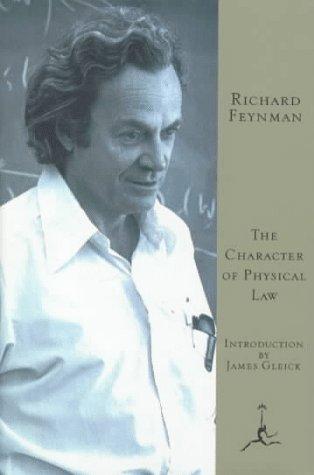167 pages
English language
Published Nov. 22, 1994 by Modern Library.

167 pages
English language
Published Nov. 22, 1994 by Modern Library.
"Richard Feynman is one of, if not the, most famous physicists of the latter half of the 20th century. In 1964, at Cornell University, he delivered the famous Messenger Lectures. This book, The Character of Physical Law, sprung from these lectures. In this classic work, Feynman explores the relationship between math and physics, describes the great conservation principles, the puzzle of symmetry in physical law, how to reconcile physical problems that yield infinite results with their manifestations in the natural world, and quantum mechanical views of nature. Feynman's accessible speech and conversational style comes through well in each essay; his simple pencil and paper drawings communicate complex ideas as if one were viewing them on a chalk board. This reissue features a foreword by Nobel Laureate Frank Wilczek, which situates the work within modern scholarship and describes why the book is still relevant today. Although he mentions areas where Feynman's …
"Richard Feynman is one of, if not the, most famous physicists of the latter half of the 20th century. In 1964, at Cornell University, he delivered the famous Messenger Lectures. This book, The Character of Physical Law, sprung from these lectures. In this classic work, Feynman explores the relationship between math and physics, describes the great conservation principles, the puzzle of symmetry in physical law, how to reconcile physical problems that yield infinite results with their manifestations in the natural world, and quantum mechanical views of nature. Feynman's accessible speech and conversational style comes through well in each essay; his simple pencil and paper drawings communicate complex ideas as if one were viewing them on a chalk board. This reissue features a foreword by Nobel Laureate Frank Wilczek, which situates the work within modern scholarship and describes why the book is still relevant today. Although he mentions areas where Feynman's theories need "updating," he points out that Feynman's unorthodox and brilliant way of thinking helped develop the general quantum electrodynamics theory, one of the most precise and accurate theories in physical science. Wilczek concludes with the assertion that this book represents Feynman at "the height of his powers, and that this "is the single best introduction to modern physics, altogether.""--